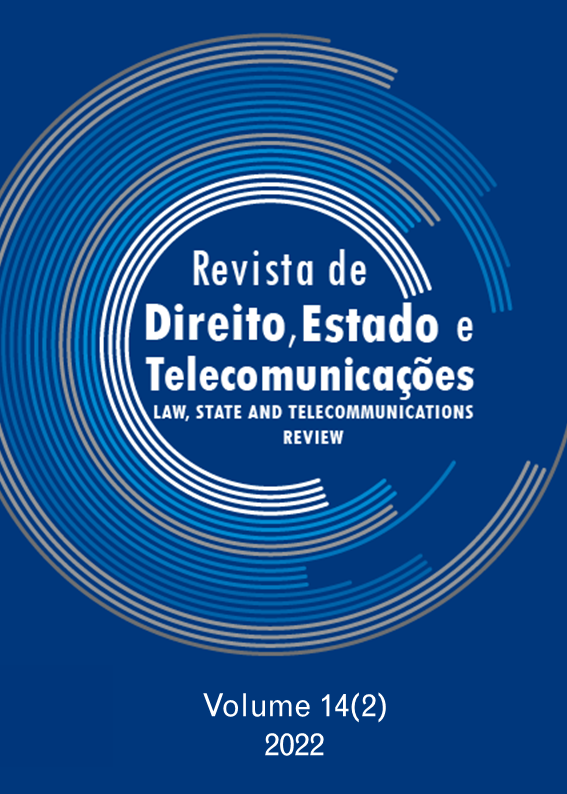Artificial Intelligence: Legal Status Determination
DOI:
https://doi.org/10.26512/lstr.v14i2.41802Keywords:
Electronic Person. Legal Status. Civil Law. IT Technologies.Abstract
[Purpose] To study the feasibility of establishing the status of artificial intelligence and outlining its characteristics, as well as to identify problems associated with the introduction of the subject of legal relations “electronic person”.
[Methodology] The main method, used in this article, was analysis of the approaches to understanding the essence of artificial intelligence and concepts of legal personality of the electronic person.
[Findings] Based on the analysis of the approaches to understanding the essence of artificial intelligence and concepts of legal personality of the electronic person, the conclusion is that the legal personality of the electronic person depends on the presence of features that characterize it as a subject of law: autonomy (separation) and personalization.
[Practical Implications] The practical significance lies in the formation of proposals for improving approaches to establishing the essence of artificial intelligence and determining the legal status of the electronic person.
Downloads
References
ALEKSEYEV, S.S. (1982). General theory of law. Moscow: Yurid. Lit.
ALEKSEYEV, S.S. (2009). General theory of law. Moscow: Prospekt.
ARTIKULENKO, O. (2018). Legal personality of a legal entity: Current challenges and unresolved issues. Entrepreneurship, Economy and Law, 6, 238-242.
ATABEKOV, A., & YASTREBOV, O. (2018). Legal status of artificial intelligence across countries: Legislation on the move. European Research Studies Journal, 21(4), 773-782.
BERTOLINI, A. (2020). Artificial intelligence and civil liability. Available at https://www.europarl.europa.eu/RegData/etudes/STUD/2020/621926/IPOL_STU(2020)621926_EN.pdf
CHEN, X., CHEN, J., CHENG, G., & GONG, T. (2020). Topics and trends in artificial intelligence assisted human brain research. PLoS ONE, 15(4), article number e0231192. https://doi.org/10.1371/journal.pone.0231192
DOGAN SAHINER, D., & KURT, Ö. (2020). Electronic personalities and legal responsibility of robotic systems produced with artificial intelligence technology. Available at https://www.mondaq.com/turkey/new-technology/955838/electronic-personalities-and-legal-responsibility-of-robotic-systems-produced-with-artificial-intelligence-technology
DOVGAN, B., & MIKHAILINA, T. (2021). Fourth-generation digital human rights through the prism of transhumanism. Entrepreneurship, Economy and Law, 1, 171-175.
European Parliament resolution of 16 February 2017 with recommendations to the Commission on Civil Law Rules on Robotics (2015/2103(INL)). (2017). Available at https://www.europarl.europa.eu/doceo/document/TA-8-2017-0051_EN.html?redirect
European Parliament resolution of 20 January 2021 on artificial intelligence: Questions of interpretation and application of international law in so far as the EU is affected in the areas of civil and military uses and of state authority outside the scope of criminal justice (2020/2013(INI)). (2021). Available at https://www.europarl.europa.eu/doceo/document/TA-9-2021-0009_EN.html
European Parliament resolution of 20 October 2020 with recommendations to the Commission on a civil liability regime for artificial intelligence (2020/2014(INL)). (2020). Available at https://www.europarl.europa.eu/doceo/document/TA-9-2020-0276_EN.html
EVERITT, T. (2018). Towards safe artificial general intelligence. Canberra: Australian National University.
G20 Ministerial Statement on Trade and Digital Economy. (2019). Available at https://www.mofa.go.jp/files/000486596.pdf
GOEL, A., & DAVIES, J. (2011). Artificial intelligence. Cambridge: Cambridge University Press.
GREDESKUL, N. A. (1909). General theory of law. St. Petersburg: Tipolitografiya I. Trofimova.
KHARYTONOV, E., & KHARYTONOVA, O. (2019). Legal relations and artificial intelligence: “Subjectivization” of the object. Kyiv: National Technical University of Ukraine “Igor Sikorsky Kyiv Polytechnic Institute”.
KHAUSTOVA, M. (2009). The subject of law as an element of the legal system of society. Journal of the National Academy of Legal Sciences of Ukraine, 3(58), 29-38.
KOLODIN, D.O., & BAITALYUK, D.R. (2019). On the issue of civil liability for damage caused by robotic mechanisms with artificial intelligence (robots). Journal of Civil Law, 33, 87-91.
MARCHENKO, M.N. (2008). Problems of the theory of state and law. Moscow: Prospekt.
MARTSENKO, N. (2019). Legal regime of artificial intelligence in civil law. Actual Problems of Jurisprudence, 4(20), 91-98.
NADYON, V.V. (2017). Subjective duty as an element of the content of civil law. Kharkiv: Pravo.
PONKIN, I.V., & REDKINA, A.I. (2018). Artificial intelligence from the point of view of law. RUDN Journal of Law, 22(1), 91-109.
Recommendation of the Council on Artificial Intelligence. OECD/LEGAL/0449. (2019). Available at https://legalinstruments.oecd.org/en/instruments/OECD-LEGAL-0449
SCHERER, M. U. (2016). Regulating artificial intelligence systems: Risks, challenges, competencies, and strategies. Harvard Journal of Law & Technology, 29(2): 353-400.
SOLUM, L.B. (1992). Legal personhood for artificial intelligences. North Carolina Law Review, 70, 1231-1287.
STEFANCHUK, M.O. (2020). Civil legal personality of individuals and features of its implementation. Kyiv: Artek.
SURDEN, H. (2019). Artificial intelligence and law: An overview. Georgia State University Law Review, 35(4), 1305-1337.
TYAGI, A. (2017). Artificial intelligence: Boon or bane? The IUP Journal of Computer Sciences, XI(2), 43-56.
WILLICK, M.S. (1983). Artificial intelligence: Some legal approaches and implications. AI Magazine, 4(2), 5-16.
YASTREBOV, O. A. (2018). Legal personality of an electronic person: Theoretical and methodological approaches. Proceedings of the Institute of State and Law of the Russian Academy of Sciences, 2, 36-55.
Downloads
Published
How to Cite
Issue
Section
License
Copyright (c) 2022 Law, State and Telecommunications Review

This work is licensed under a Creative Commons Attribution 4.0 International License.
By submitting this paper to the Law, State and Telecommunications Review,
I hereby declare that I agree to the terms of the Creative Commons Attribution 4.0 International (CC BY 4.0).


